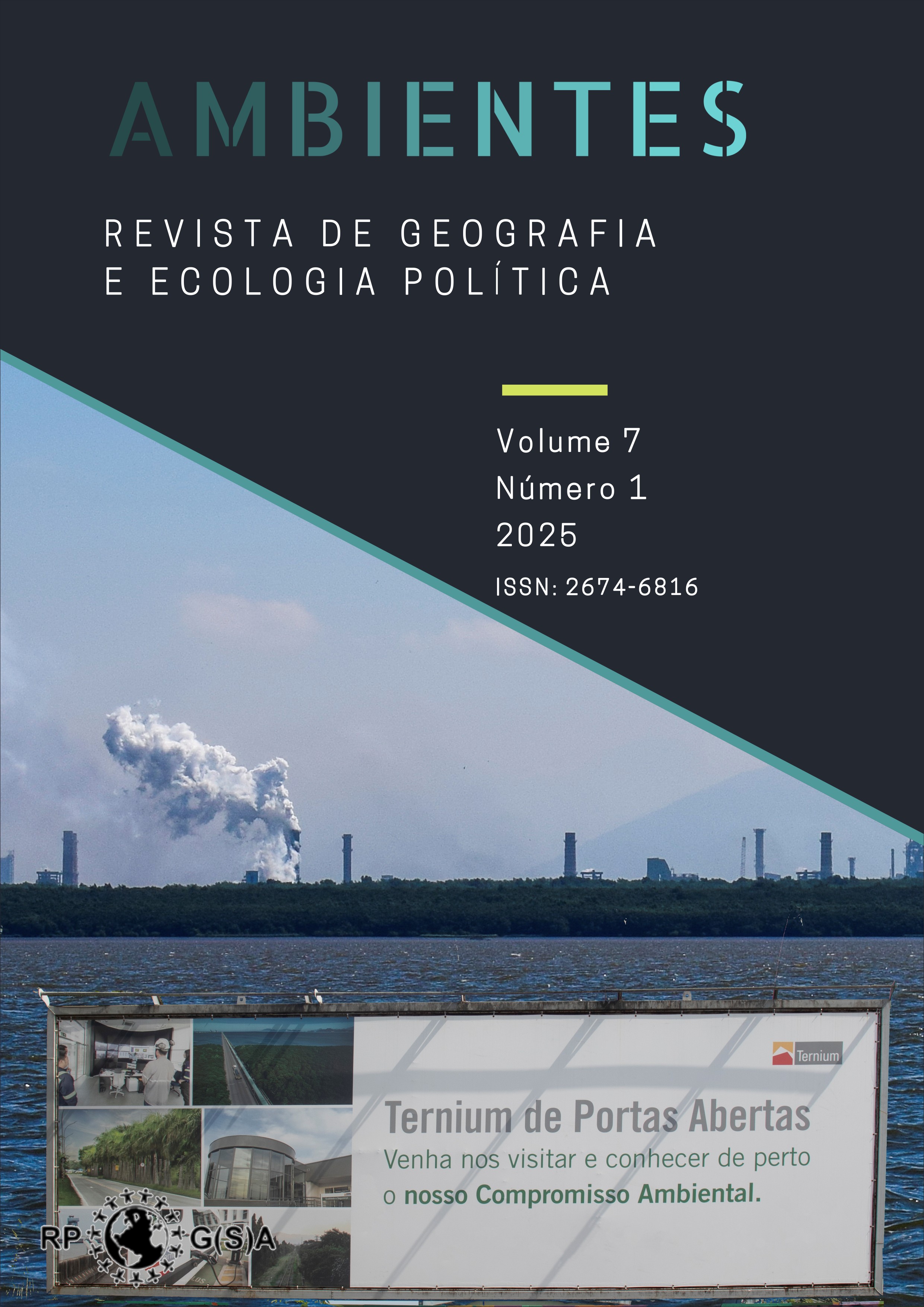A investida do agronegócio na educação: Análise do discurso ambiental da Associação Brasileira do Agronegócio (ABAG)
DOI:
https://doi.org/10.48075/amb.v7i1.34819Resumo
A análise da inserção do agronegócio na educação, considerando suas intencionalidades e efeitos, é o objetivo central de nossas investigações. Neste artigo, o recorte analítico teve por foco a dimensão ambiental do discurso deste setor, que pode ser inserido no componente da Educação Ambiental (EA). Para tanto, realizamos uma revisão de literatura sobre a temática, procedendo, em seguida, a uma pesquisa documental por meio do exame da legislação vigente e dos discursos ambientais presentes nos Módulos do Programa Educacional “Agronegócio na Escola” (PEAE), desenvolvido pela Associação Brasileira do Agronegócio da região de Ribeirão Preto (ABAG/RP). O estudo, de abordagem qualitativa, tem por premissa o método materialista histórico e dialético, assim como tem por inspiração contribuições da vertente teórica da Análise Crítica do Discurso (ACD). Como resultado, foi possível verificar que a investida do agronegócio nas escolas públicas do país visa difundir imagens positivas do setor no que se refere à sustentabilidade, desassociando e/ou negando sua relação com os problemas ambientais. Assim sendo, a inserção do agronegócio na educação, incluindo o empresariamento da oferta da EA no ensino formal, mediante uma Educação Ambiental Empresarial do Agronegócio (EAEA) pragmática e conservadora, parece ser um processo em curso e potencialmente adverso, visto esvaziar tanto a educação como a Educação Ambiental do seu potencial crítico.
Palavras-chave: Educação Ambiental; Agronegócio; Sustentabilidade.
The agribusiness incursion in education: An analysis of the environmental discourse of the Associação Brasileira do Agronegócio (ABAG)
Abstract
The analysis of the insertion of agribusiness in education, considering its intentions and effects, is the central objective of our investigations. In this article, the analytical focus focused on the environmental dimension of the discourse in this sector, which can be inserted into the Environmental Education (EE) component. To this end, we conducted a literature review on the subject, followed by documentary research through the examination of current legislation and the environmental discourses found in the Módulos do Programa Educacional “Agronegócio na Escola” (PEAE) developed by the Associação Brasileira do Agronegócio da região de Ribeirão Preto (ABAG/RP). The study, with a qualitative approach, is based on the historical and dialectical materialist method, as well as drawing on contributions from the theoretical strand of Critical Discourse Analysis (CDA). As a result, it was possible to verify that the agribusiness investment in the country's public schools aims to spread positive images of the sector in terms of sustainability, disassociating and/or denying its relationship with environmental problems.Thus, the insertion of agribusiness into education, including the entrepreneurial approach of EE provision in formal education, through a pragmatic and conservative conservative Educação Ambiental Empresarial do Agronegócio (EAEA), appears to be an ongoing and potentially adverse process, as it weakens both education and Environmental Education of their critical potential.
Keywords: Environmental education. Agribusiness. Sustainability.
La inserción del agronegocio en la educación: Análisis del discurso ambiental de la Associação Brasileira do Agronegócio (ABAG)
Resumen
El análisis de la inserción de los agronegocios en la educación considerando sus intenciones y efectos, es el objetivo central de nuestras investigaciones. En este artículo, el enfoque analítico se centró en la dimensión ambiental del discurso en este sector, que puede insertarse en el componente de Educación Ambiental (EA). Para tanto, realizamos una revisión bibliográfica sobre el tema, procediendo, además, con una investigación documental, por medio del examen de la legislación vigente en Brasil y de los discursos ambientales presentes en los Módulos do Programa Educacional “Agronegócio na Escola” (PEAE). Tal programa es desarrollado por la Associação Brasileira do Agronegócio da região de Ribeirão Preto (ABAG/RP). Este estudio, con un abordaje cualitativo, se basó en el método materialista histórico y dialéctico, además de que se ha apoyado en el aspecto teórico metodológico del Análisis Crítico del Discurso (ACD). Como resultado de la investigación hecha, pudimos comprobar que la inserción del agronegocio en las escuelas públicas brasileñas tiene por fin difundir imágenes positivas del sector en cuanto a la sostenibilidad. Así, promoviendo una desvinculación y/o negación de su relación con los problemas ambientales. Por lo tanto, la inserción de los agronegocios en la educación, incluyendo la provisión mercantil de la EA en la educación formal, a través de una Educação Ambiental Empresarial do Agronegócio (EAEA) pragmática y conservadora, apunta para un proceso continuo y potencialmente adverso a lo que presupone la legislación brasileña. Así que, tal proceso vacía de potencial crítico tanto la educación como la Educación Ambiental.
Palabras clave: Educación Ambiental; Agronegocios; Sostenibilidad.
Downloads
Publicado
Como Citar
Edição
Seção
Licença

Este trabalho está licenciado sob uma licença Creative Commons Attribution-NonCommercial-ShareAlike 4.0 International License.
Aviso de Direito Autoral Creative Commons
Política para Periódicos de Acesso Livre
Autores que publicam nesta revista concordam com os seguintes termos:
1. Autores mantém os direitos autorais e concedem à revista o direito de primeira publicação, com o trabalho simultaneamente licenciado sob a Licença Creative Commons Attribution que permite o compartilhamento do trabalho com reconhecimento da autoria e publicação inicial nesta revista.2. Autores têm autorização para assumir contratos adicionais separadamente, para distribuição não-exclusiva da versão do trabalho publicada nesta revista (ex.: publicar em repositório institucional ou como capítulo de livro), com reconhecimento de autoria e publicação inicial nesta revista.
3. Autores têm permissão e são estimulados a publicar e distribuir seu trabalho online (ex.: em repositórios institucionais ou na sua página pessoal) a qualquer ponto antes ou durante o processo editorial, já que isso pode gerar alterações produtivas, bem como aumentar o impacto e a citação do trabalho publicado (Veja O Efeito do Acesso Livre).
Licença Creative Commons
Esta obra está licenciada com uma Licença Creative Commons Atribuição-NãoComercial-CompartilhaIgual 4.0 Internacional, o que permite compartilhar, copiar, distribuir, exibir, reproduzir, a totalidade ou partes desde que não tenha objetivo comercial e sejam citados os autores e a fonte.


